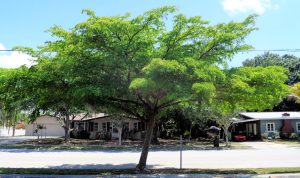
Have you ever seen a black olive tree in our community? Specifically, there is a cultivar of black olive called ‘Shady Lady’ which is being planted in the warmer parts of Charlotte County. Terminalia buceras or black olive is a Florida-Friendly Landscaping™ approved tree and may be a good addition to your landscape.
The black olive tree can grow from hardiness zones 10B to 11, so coastal areas in dependably warmer sites are a must. A black seed capsule gives this tree its name, but it should not be confused with the familiar edible olive – nothing edible here! Growing up to thirty-feet tall, this evergreen tree is fairly wind-resistant and is known for its tiered, horizontal growing habit. This flattened, medium-sized street tree makes it very suitable for producing shade, as a highway median tree and even as a large hedge. The leaves are dark bluish-green and leathery in texture growing on zigzag patterned stems. Black olives are known to be very tolerant to salt spray and can also be considered drought tolerant once established. Terminalia buceras are not fast growers and do best in full sun to part shade conditions. They prefer well-drained soils which are not too high in pH. If soils are too alkaline, leaves may show some yellowing.
Several disadvantages of using black olives in the landscape also need to be highlighted. They can on occasion become infested with a small caterpillar that cause temporary partial defoliation. Any leaves lost usually quickly regrow. Also, the tannin-rich caterpillar droppings, and mite-induced galls, can cause stains on sidewalks and driveways below the tree. The gall-inducing mites are rare this far north, however. You may also notice in mature trees the presence of neat rows of small holes spiraling up the trunk. Not to fear, this is a sign of yellow-bellied sapsuckers at work! The holes these woodpeckers make are for sap and to attract the insects they feed on. It does not hurt the tree in anyway and quickly seals up.
As mentioned earlier, black olives are frost sensitive and will be slightly damaged at thirty-two degrees F. At twenty-five degrees F, black olives are killed. With this warning in mind, it is recommended that this tree not be planted east of Interstate 75 unless there is a known stable microclimate.
The black olive cultivar called ‘Shady Lady’ black olive is the most commonly planted black olive in our area. This cultivar is more compact and denser than the species and is very ornamental and eye-catching. Weigh the advantages and disadvantages of this tree before you make a commitment. As always, “Plan Before You Plant” and make the right choice for your landscape. In the right place, the black olive will make a sustainable and gorgeous medium-sized shade tree. For more information on ornamental trees suitable for our area, or to ask a question, please visit https://www.facebook.com/CharlotteMGLifeline/ . You can also call the Master Gardener Volunteer Helpdesk on Mondays, Wednesdays and Fridays from 1 to 4 pm at 764-4340 for gardening help and insight into their role as an Extension volunteer. Ralph E. Mitchell is the Director/Horticulture Agent for the UF/IFAS Charlotte County Extension Service. He can be reached at 941-764-4344 or ralph.mitchell@charlottecountyfl.gov.
Resources:
Gilman, E. F., Watson, D. G., Klein, R. W., Koeser, A. K., Hilbert, D. R. and McLean, D. C. (2019) Terminalia buceras: Black Olive. The University of Florida Extension Service, IFAS.
Leonard, D. J. (2017) Why Are There Holes in My Tree? The University of Florida Extension Service, IFAS – Calhoun County.
Robbins, J. A. (2020) Sapsucker Damage on Woody Plants. The University of Arkansas Extension Service.
Boas, S. (2010) A Sapsucker Finds a Sycamore Tree to Call Her Own. Orlando Sentinel.
Caldwell, D. (2018) Do You Have Rusty Staining Under the Old Bucida (Black Olive) Tree? It’s the caterpillars or galls. The University of Florida Extension Service, IFAS – Collier County
The Florida-Friendly Landscaping™ Guide to Plant Selection & Landscape Design. (2010) The University of Florida Extension Service, IFAS.
Landre, C. (2021) Shady Lady Black Olive Tree. South-Florida-Plant-Guide.com.
 0
0
